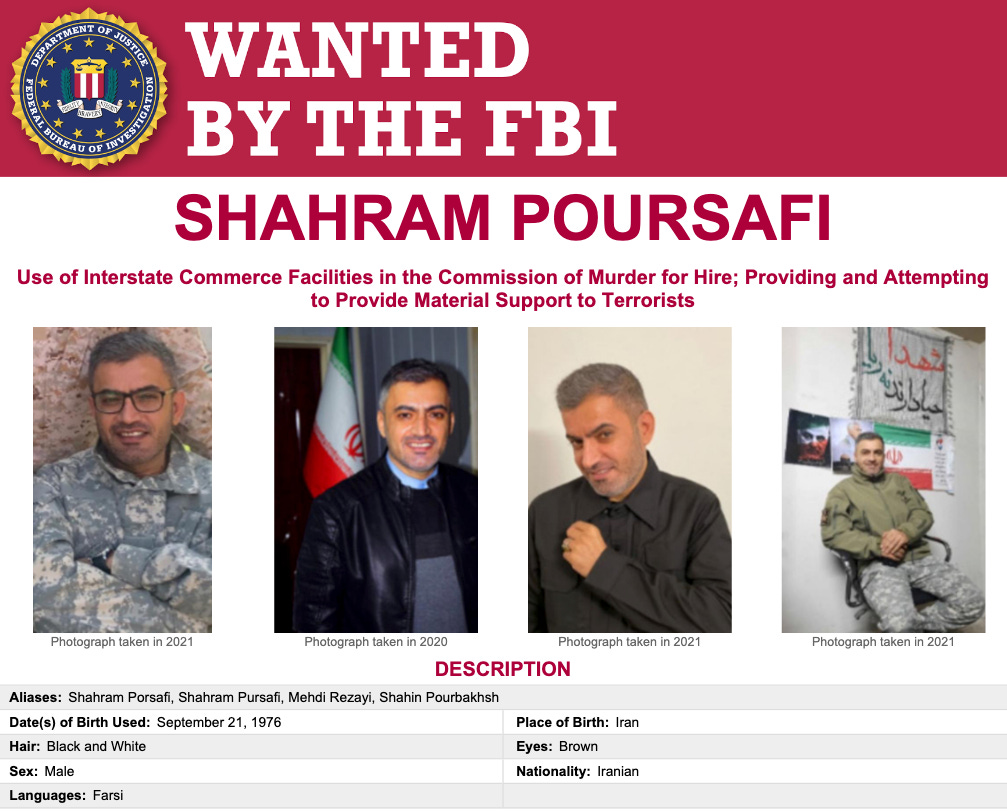The Case Testing U.S. Deterrence & Democracy
With Halkbank's prosecution back on the table and Trump courtiers steering the Justice Department, the outcome is a key barometer of rule of law, democratic integrity and U.S. national security.
What do former National Security Adviser John Bolton and Turkish President Recep Tayyip Erdoğan have in common?
Both claim President Donald Trump privately offered to intervene in a criminal case involving a massive breach of U.S. national security. Trump, according to both men, has offered to intercede on behalf of Halkbank, Turkey’s state-owned bank accused of helping Iran sidestep an international sanctions campaign meant to curb Iran’s nuclear weapons program.
But while the U.S. president has allegedly worked to get Halkbank off the hook for abetting Iran’s terror-designated regime, his Department of Justice is working to put his former top security chief–a fierce Iran-policy hawk–behind bars.
The Halkbank prosecution sits at the intersection of sanctions enforcement, separation of powers, and foreign influence on U.S. justice. It is a benchmark for both the state of U.S. democracy and national security. Aside from substantiating allegations of abuse of presidential power, Trump’s apparent efforts to shield Halkbank risk eroding a cornerstone of U.S. financial diplomacy by emboldening other sanction-busting regimes, warn lawmakers, former U.S. officials and analysts.
The case now stands as a barometer of whether political and business relationships can override criminal accountability in U.S. courts, accountability that current and former officials say is critical to ensuring the credibility of U.S. sanctions power.
Two Cases, One Pattern of Power
Both Bolton and Halkbank have made headlines in recent weeks. In early October, the Supreme Court rejected another bid by Halkbank to avoid fraud, money laundering and conspiracy charges. Turkey’s president Tayyip Erdoğan then told journalists after meeting with Trump that the president had assured him that “The Halkbank problem is over for us.” Turkish officials suggested a $100 million settlement of the criminal case, a figure that pales in comparison both to the sums the institution laundered for Iran and the multi-billion-dollar penalties levied against other banks for other violations in years past.
And just a week after the Halkbank news, Bolton was criminally indicted in a completely separate case for allegedly mishandling classified national security information. Although the indictment details numerous examples of Bolton sharing top-secret intelligence, the former security chief and others suggest it is political retribution, including for blowing the whistle on Trump for intervening in the Halkbank case.
Federal attorneys in the Halkbank criminal prosecution have shown how the bank and officials at the highest levels of Turkey’s government helped Tehran funnel tens of billions of dollars in Iranian oil revenues through front companies and fake food-and-gold trades to evade U.S. sanctions. Using invoices, financial transfers, wire records, and testimony from senior Halkbank insiders involved in the scheme, they also accused Erdoğan, his son-in-law and several top cabinet officials of complicity in the scheme.
Halkbank’s aid, say current and former U.S. officials, fundamentally weakened the West’s negotiating leverage as it sought to pressure Tehran in 2011-2016 to halt its nuclear program, providing Iran with a critical financial lifeline in one of the biggest sanctions-busting schemes in modern history.
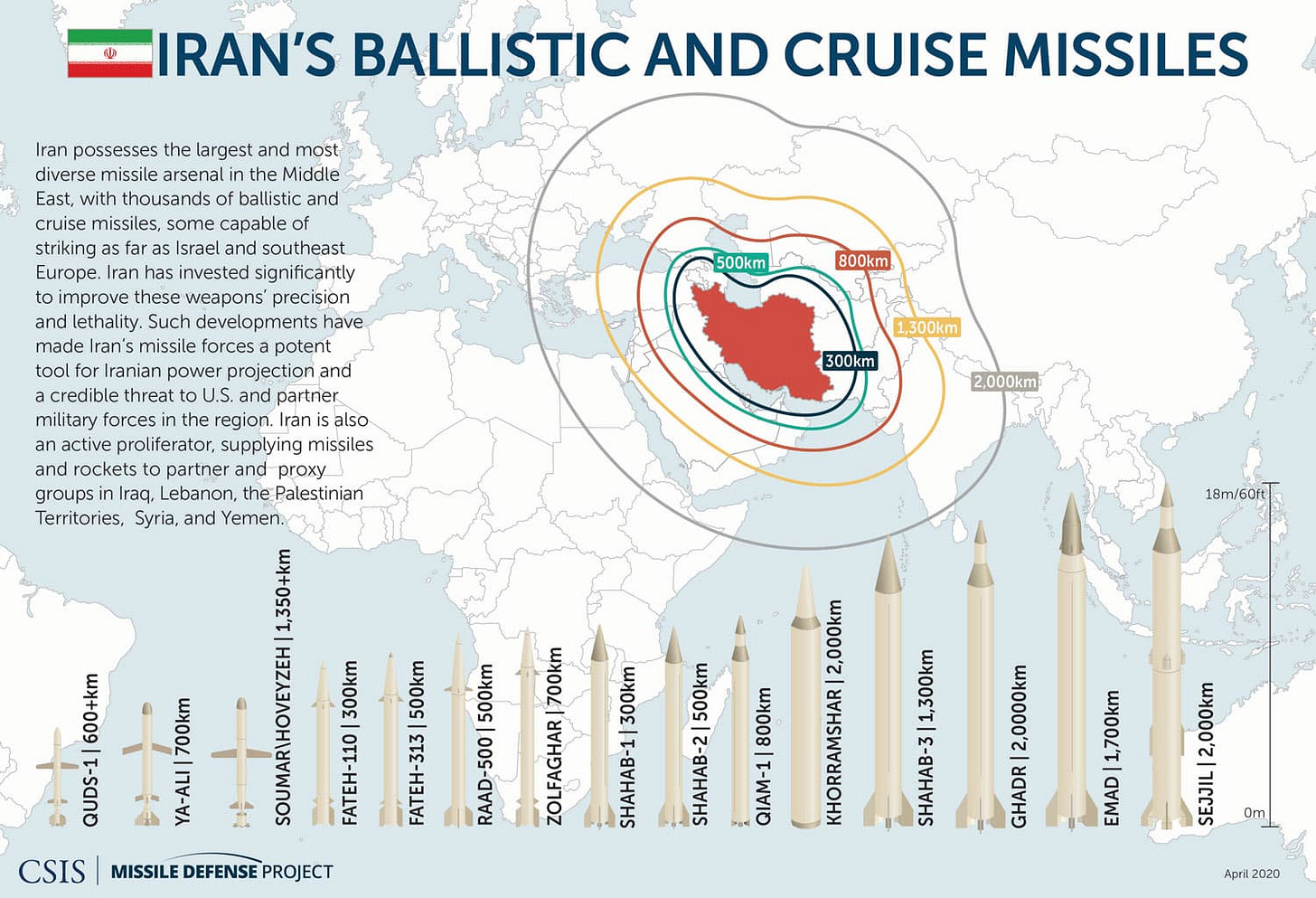
A Threat to U.S. Leverage and the Global Sanctions Regime
Given the scope of the sanctions evasion, allowing the case to settle would represent a major setback for Washington’s anti-money-laundering and sanctions regime, lawmakers, current and former officials and analysts say. Failure to hold banks to account sends a dangerous signal to other autocracies seeking to undermine U.S. global power, they warn.
(The White House didn’t respond to a request for comment on this article, other than an automated response that blamed any potential delayed response on the Democrats.)
On the surface, Trump’s promised intervention could be perceived as representing the competing pressures of maintaining strategic alliances versus upholding the integrity of U.S. justice. Erdoğan, like his predecessors who ruled what is now Turkey for thousands of years, has exploited the state’s geographical position as a strategic nexus of trade and empire to project power both East and West.
But there’s sufficient evidence to posit that it’s not simply a clash between statecraft and justice, but rather, as Bolton and others say, an exhibition of abuse of presidential authority for personal, private and political ends.
“Trump’s global business empire creates the conditions for his ongoing violation of the Emoluments Clause to surface in obviously dubious transactions,” two former chief White House ethics lawyers warned in 2016, citing the president’s business dealings in Turkey among other examples. Those transactions cast “doubt on the ability and inclination of a President Trump to conduct himself with a singular focus on the Nation’s interests and of foreign leaders dealing with him to treat his motives as public-spirited.”
Halkbank is a perfect example, say lawmakers, former officials and analysts.
When Turkish-Iranian gold trader Reza Zarrab was arrested in 2016 for orchestrating a multi-billion-dollar sanctions-evasion scheme through Turkey’s state-owned Halkbank, he quickly became the case’s most potent witness. Inside federal courtrooms, Zarrab laid out in vivid detail how the bank’s executives — with the blessing of senior Turkish officials — helped Iran secretly move billions in oil revenue through sham food and gold trades, gutting U.S. sanctions meant to choke off Tehran’s nuclear program.
Prosecutors would later call him their star witness. But Halkbank’s allies in Ankara saw him as a liability that needed to be silenced.
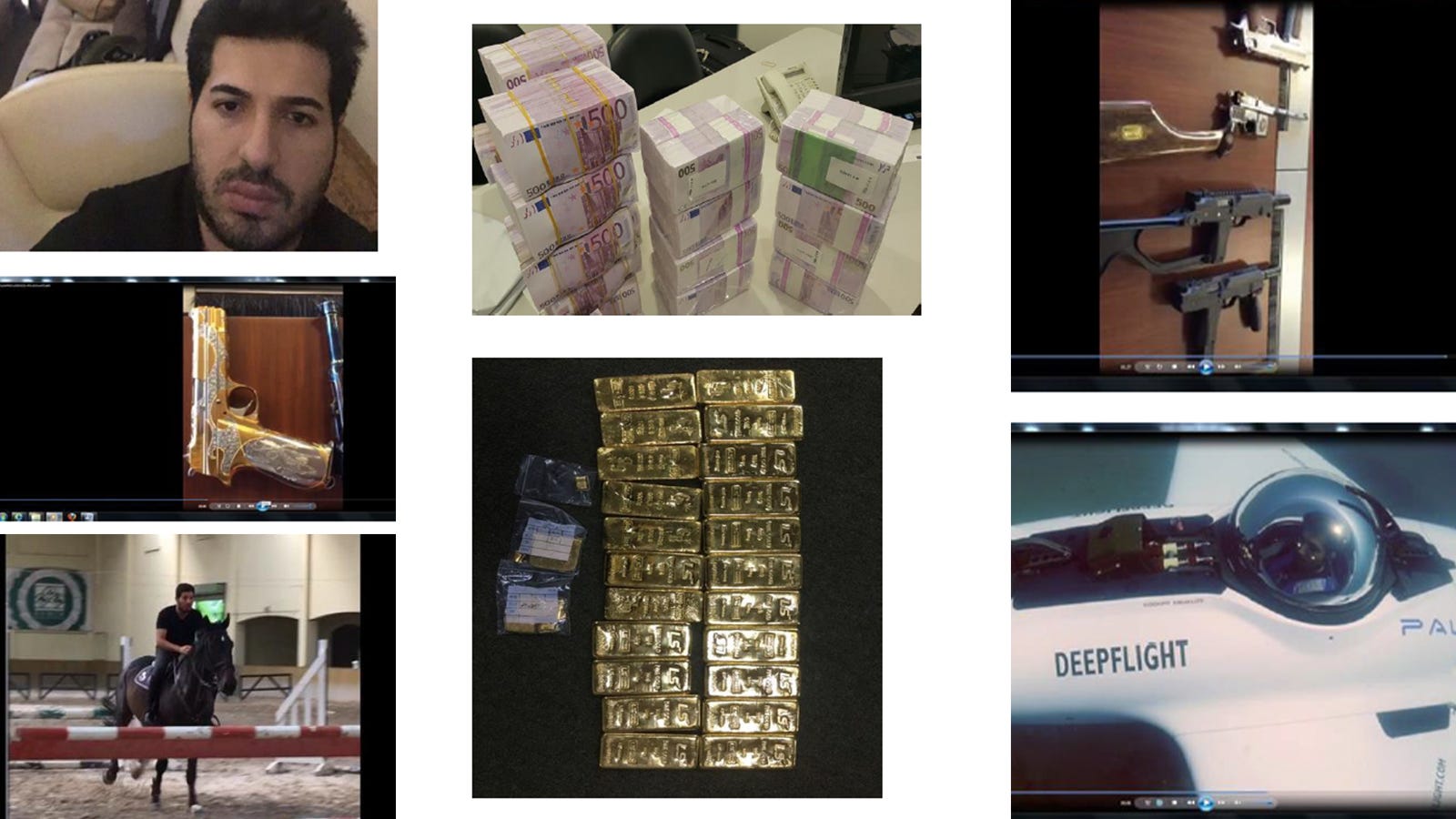
The Backchannel
Enter Rudy Giuliani, a longtime Trump confidant who would later become the president’s personal attorney, (and who Trump in September vowed to award the nation’s highest civilian honor, the Presidential Medal of Freedom). Giuliani took up Zarrab’s case—even while he advised the president and as his firm represented the government of Turkey—creating a potential conflict of interest flagged by the court. It warned that his proximity to the president and dual engagements risked blurring the line between private defense work and diplomatic influence.
Partnering with former Attorney General Michael Mukasey, Giuliani lobbied top U.S. officials, including Trump and Secretary of State Rex Tillerson, to negotiate Zarrab’s release or swap him in a deal with Turkey. According to former officials, Giuliani framed it as a matter of diplomacy, but Justice Department insiders saw it as a back-channel effort to quash a criminal case that implicated both Halkbank and Erdoğan’s inner circle. Trump reportedly also asked then-Secretary of State Rex Tillerson and his then Attorney General William Barr to intercede in the case. But while Tillerson and other aides refused, calling the request improper, Barr allegedly asked that Turkey accept a deferred prosecution agreement, offering what some called a “sweetheart deal” for the bank.
Zarrab, the scheme’s confessed architect, testified in U.S. court that both Erdoğan and members of his cabinet were involved in getting Halkbank to continue channeling Iranian funds through Turkey in violation of U.S. sanctions. Prosecutors provided bank records, emails, texts and wiretapped recordings of officials as evidence.
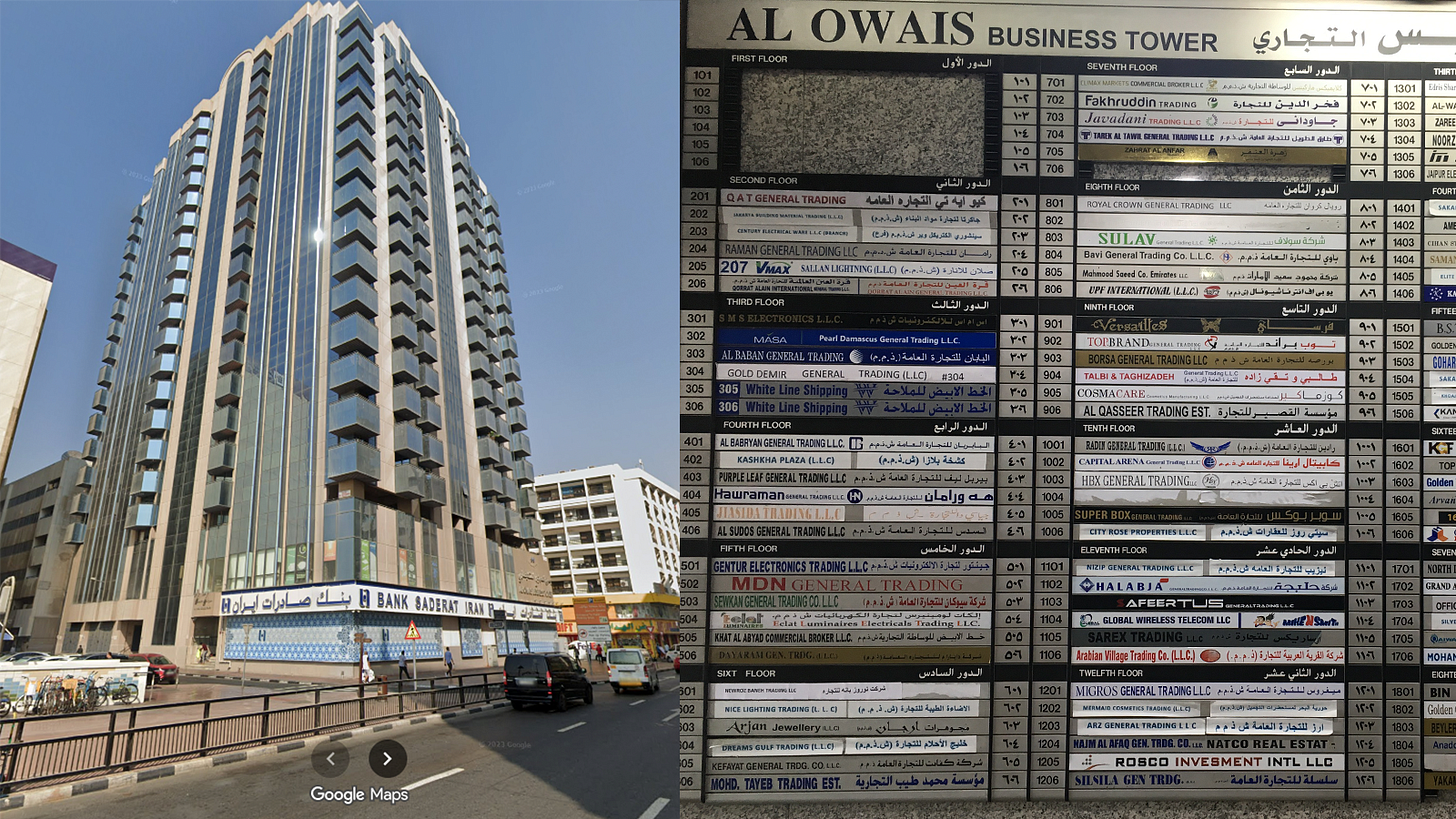
The horsetrading over Zarrab fit into the narrative of claims made by Trump’s former national security advisor. According to Bolton’s memoir, The Room Where It Happened, and leaked excerpts of a draft manuscript, Trump told Erdoğan “he would take care of things, explaining that the [New York] southern district prosecutors were not his people but were Obama people, a problem that would be fixed when they were replaced by his people.”
Selective Justice: Punished Critics, Protected Allies
Bolton’s indictment, though largely unrelated in substance, underscores the asymmetry: a critic punished, an ally indulged.
Although the prosecution of John Bolton is being carried out by career national-security prosecutors at the United States Department of Justice, the case’s origins trace back to civil and investigative efforts launched during the first Donald Trump administration. While Bolton was accusing Trump and his courtiers of obstruction in the Halkbank case, the Justice Department in 2020 filed a civil suit seeking to block his memoir on the grounds that it contained classified information, and opened a criminal inquiry into the same underlying disclosures. Both the civil case and the DoJ investigation were dropped in 2021. But then an Iranian hack of Bolton’s personal account triggered another investigation, according to the indictment. The prosecution, citing the type of classified documents shared, said the indictment doesn’t rely information used in the published memoir, and some analysis asserts the government has a strong case against Bolton.
Still, Bolton’s case stands in stark contrast to Trump’s efforts on behalf of Halkbank and his pardon of more than a half dozen people convicted on fraud, money-laundering or related crimes, including his pardon of Changpeng Zhao, founder of Binance, last week. Not insignificantly, Binance had business dealings involving the Trump-family crypto venture World Liberty Financial, raising questions about possible favoritism or political alignment surrounding the pardon.
Bolton’s record, meanwhile, shows him as one of the most aggressive U.S. officials on Iran, including persistently advocated for regime change in Tehran. (In fact, besides hacking his email, the Iranians plotted to assassinate Bolton, among other former senior officials.)
In contrast, Halkbank’s representation by Trump allies has given Tehran’s chief facilitator special favor with the president. Besides Guiliani, Halkbank and Turkey paid millions of dollars hiring the “go-to” lobbying house for entities seeking access to the Trump administration, rooted in direct personal and fundraising relationships with Trump and his ecosystem. The firm was founded by Brian Ballard, the head of Trump’s Florida finance committee during the 2016 campaign. Principals have included former White House chief of staff and current Trump aide, Susie Wiles, his new attorney general, Pam Bondi, until her confirmation in January, and managing partner Daniel McFaul, who was on Trump’s presidential transition team.
Bondi was at Ballard while the firm represented Halkbank and Turkey’s government, according to Foreign Agent Registration Act data.
The Business Nexus: TAIK and the Trump Connection
Similarly, the heads of the same state-linked Turkey-U.S. Business Council (TAIK) that sought political relief for Halkbank have long cultivated personal ties to Trump and his allies, including through his real estate investments in Turkey.
Until August, the TAIK was chaired by Mehmet Ali Yalçındağ, a Turkish businessman who befriended the Trump family more than a decade ago while brokering the Trump Towers Istanbul licensing deal.
At the 2012 ribbon-cutting in Istanbul, Trump thanked Yalçındağ by name, saying: “I hope that the other projects we will do in Turkey will be good…We will continue our investments.”
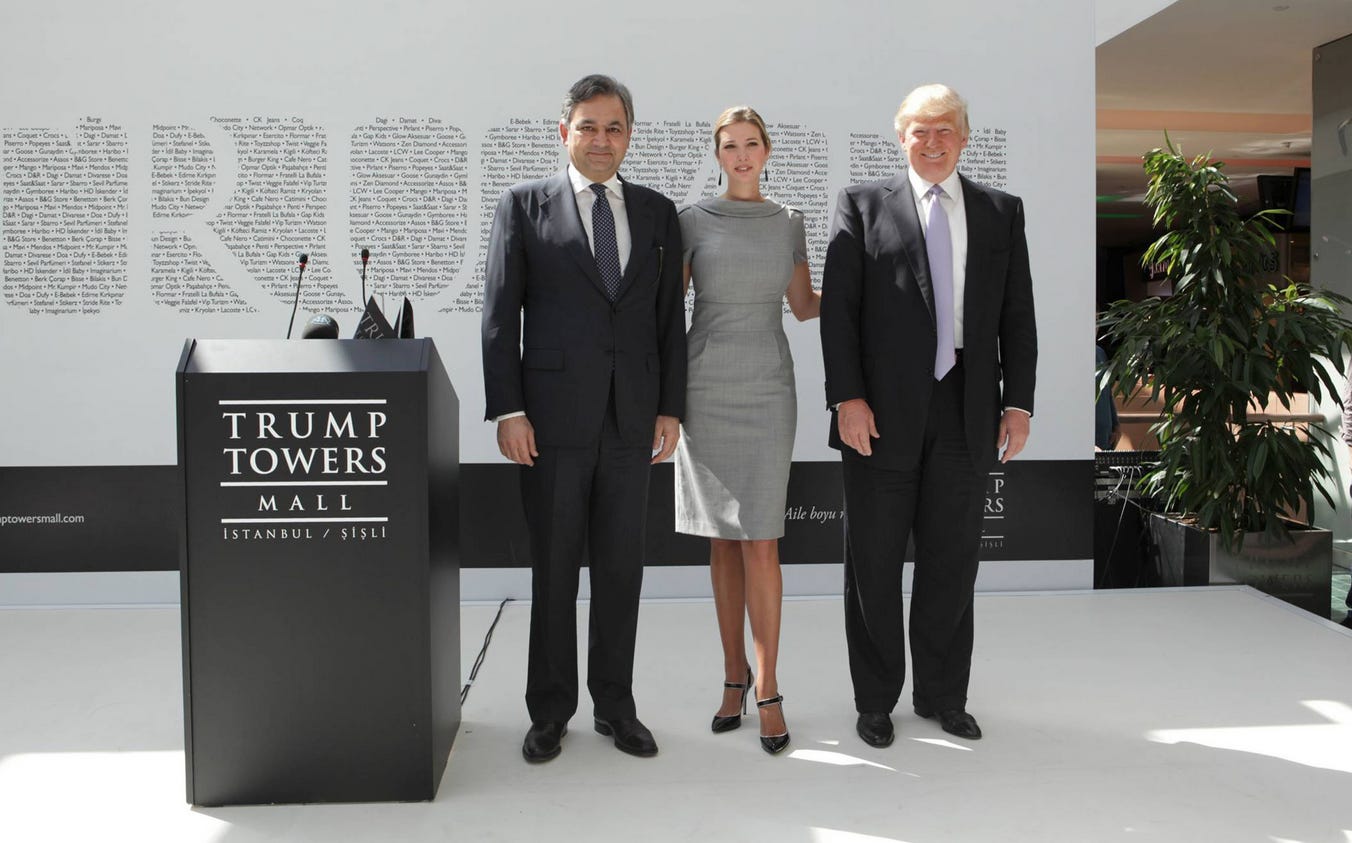
Trump disclosed earning between $1 million and $5 million annually from the Istanbul deal in both 2016 and 2017, and continues to report income in recent filings.
“I have a little conflict of interest in Turkey because I have a major, major building in Istanbul,” Trump said in a 2015 interview with Breitbart News Daily (1:11). “It’s called Trump Towers – two towers instead of one.”
That business relationship evolved into a personal friendship not only with Trump but also with his daughter Ivanka Trump and son-in-law Jared Kushner. Yalçındağ attended Trump’s 2016 election-night victory party, and Trump later referred to him as a “close friend” during a call with President Erdoğan.
As head of TAIK, Yalçındağ helped arrange meetings for Ankara with top U.S. officials, leveraging both his business contacts and paying U.S. lobbying firms, according to Foreign Agents Registration Act filings and people familiar with the matter. Notable were meetings arranged for a senior Turkish minister whom federal prosecutors and witnesses say helped direct the multibillion-dollar money-laundering operation for Iran at Halkbank, Berat Albayrak, President Recep Tayyip Erdoğan’s son-in-law and then finance minister, according to people familiar with the matter and Justice Department filings.
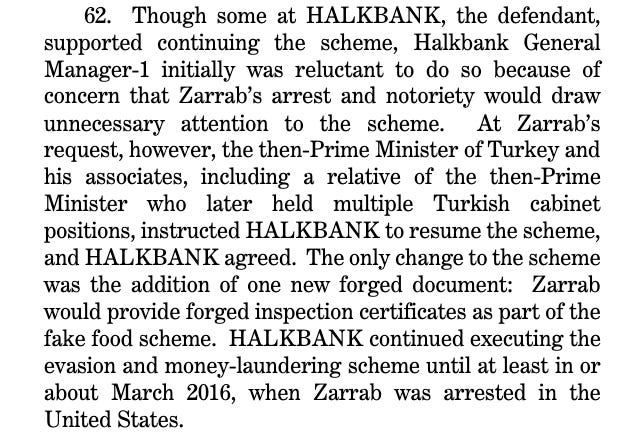
Yalçındağ and Albayrak had history together: In 2016, leaked emails between the two revealed an improper entanglement between political power and the press—showing Yalçındağ appeared to steer coverage by the Doğan Media conglomerate he controlled toward ruling-party interests. The disclosures triggered a scandal that forced his resignation as head of that media empire.
It was after that debacle that Yalçındağ was appointed to lead (TAİK), which analysts said was a reward for loyalty to the Erdoğan clan. The council, say those analysts, functions less as an independent business association than as an arm of Erdoğan’s government, with its chairmanship vetted by a parliament committee dominated by the ruling party.
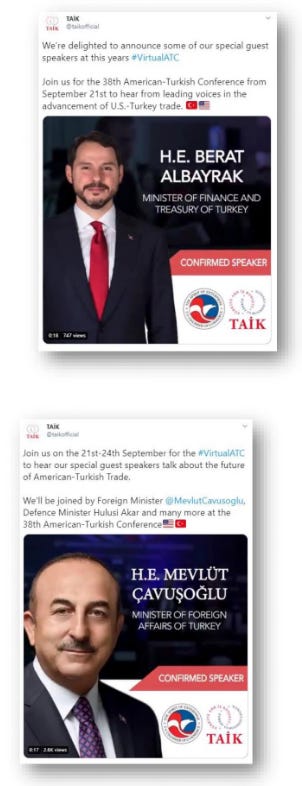
Yalçındağ efforts as interlocutor included an April 15, 2019 Oval Office meeting with President Trump, Kushner, and then Treasury Secretary Steven Mnuchin to discuss both Halkbank and Turkey’s purchase of Russia’s S-400 missile system—a deal Pentagon officials warned could endanger U.S. interests.
Afterward, Albayrak told Turkish reporters he left the meeting with a “positive impression.” Trump subsequently held off sanctions against Turkey until a bipartisan defense bill in late 2020 forced his hand.

(Yalçındağ’s career has also drawn scrutiny for his past role as CEO of Yandex Turkey, the local branch of a Russian tech company accused of being leveraged by the Kremlin as a propaganda tool.)
TAIK previously came under scrutiny during the 2017 probe of former Trump National Security Adviser Michael Flynn, who pleaded guilty to lying about his work for Turkish and Russian interests. Flynn’s payments had been funneled through a Dutch shell company owned by Yalçındağ’s predecessor at TAIK, Ekim Alptekin.
The Consequence: Capture and Credibility
Collectively, these interlocking relationships reveal how Trump’s web of loyalists and lobbyists appear to have evolved into a parallel apparatus of influence - one capable of bending diplomacy, justice, and national security to Trump’s personal and political ends, say former White House ethics lawyers and analysts. The nature of these circumstances reflect elements of state capture - where the institutions of government that are supposed to serve the people are “captured” by special interests and used to protect insiders, allies, or foreign patrons.
Such strategic capture—honed into geopolitical dark arts by Russia, China and Iran—represents a dual threat by providing entrée to foreign interests that run counter to those of the citizens the U.S. president has sworn to protect.
If a president and his retinue–including the head of the Justice Department–can rewrite the consequences of a sanctions-busting scheme that bankrolled an enemy’s nuclear program, then the breach isn’t confined to Halkbank.
It extends to the foundations of America’s deterrence and the credibility of its democracy.




